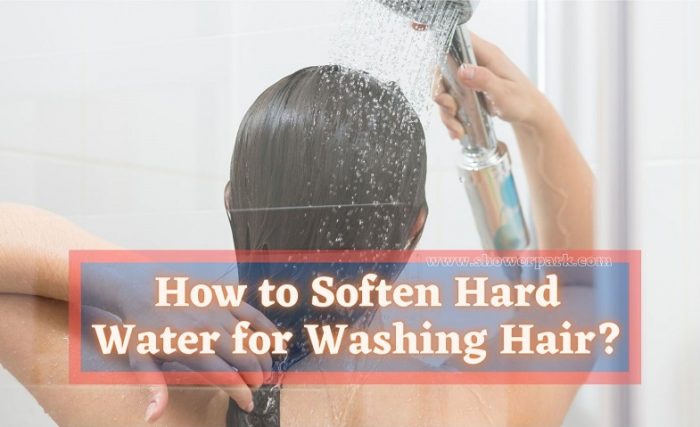Dry hair, dandruff, or frizziness is something many people struggle with. And most of the time, the reason behind this is hard water.
So, instead of changing shampoos, hair products and washing hair more frequently to eliminate the straw-like feel, you should think about softening the hard water.
But how to soften hard water for washing hair? There are different ways, some involve permanent solutions like installing a whole-house softening system, and others give you temporary yet effective remedy.
In this article, we’ll go over the issues you’re likely to encounter when washing your hair with hard water, as well as some helpful solutions. Keep reading; you are sure to find the answers to your hair problems.
Is There a Way to Soften Hard Water?
Although hard water is problematic in various instances, it isn’t exactly harmful to your health. The mineral salt dissolved in hard water might deposit in the plumbing lines, leading to clogging and corrosion.
You will also experience a hard time doing laundry as the chemical in the cleaning agent might react with hard water salts.
So, the question is, is there a way to soften hard water? Actually, there are several ways. Let’s have a quick look into those.
Whole House Softener
The most effective way would be to install a softener in your house. While it’s expensive, you get total relief from the mineral in this way.
Boiling
For kitchen purposes, you can boil the water to remove its temporary hardness. This way, some salts deposit in the bottom of the container.
Water Conditioner For Laundry
Adding a conditioner to your laundry water is an easy way to deal with hard water—the reagents in the conditioner block the magnesium and calcium ions from reacting with the detergent molecules. So, your clothes are washed better.
However, the conditioner shouldn’t produce any precipitation, be sure of that before buying.
Other ways
Besides these options, you can add a faucet softener to a particular tap or use the chelation system to soften the water.
Problem of washing Hair with Hard Water
Hard water contains different salts, mainly magnesium and calcium, which are absent in soft water.
So, when you wash your hair with water containing various salts, the shampoo and the salts form a kind of complex that leaves residue on the surface of your hair.
And due to such buildups, your hair can’t absorb the conditioner’s moisture, causing frizziness and dryness. You might also feel your hair becoming straw-like that makes you wash your hair more frequently.
But the thing is, the more you wash your hair with hard water, the more the buildup becomes, and your hair gets less moisture. The residue can form in the scalp, too, causing scalp dryness, dandruff, and itching.
All these things contribute to the breakage and thinning of your hair. So, using hard water for a very long time is likely to increase your hair fall.
In addition, frequent washing in hard water also affects your hair color. Over time, your dyed hair will fade and lose the smooth texture.
How to Soften Hard Water for Washing Hair?
No, water with dissolved minerals is not very good for your hair. But the good news is, it’s not impossible to soften the water.
Check below how to soften hard water for washing hair and deal with your hair problems.
Softeners
Softeners or home softening systems are the most effective and permanent solution to all your hard water problems. They might be expensive, but if you want your way out of temporary solutions, get a softener.
There are various types of softeners available, including ion exchange and reverse osmosis softeners. They remove all hardness-causing minerals, like magnesium, salt, and calcium, from the water.
You can also add an electric or magnetic escalator system to your home.
Hard Water Shower Filter
Hard water softener shower filters reduce the minerals from water which leaves residue on your skin and hair.
These are comparatively cheaper options than softeners to solve your hair problems. Installation is also straightforward, but don’t expect the filters to be as efficient as the softeners.
You can also find vitamin C shower filters that neutralize hard water minerals by spewing powdered Vitamin C.
Vinegar or Citrus Rinse
Vinegar and citrus rinse are among natural home remedies to deal with your hair problems caused by hard water. Now, these rinses don’t soften the water, but with their low pH value, they neutralize the minerals and prevent the limescale buildups.
You can make a vinegar rinse with 1 part vinegar and 2 part water and the citrus one with lemon and water mixed at a ratio of 1:3.
Apply the rinse after you are done with shampooing, massage, and leave it for five minutes. Wash your hair afterward. Your hair will be softer and smoother using these rinses once a week.
Using a Demineralizing or Clarifying Shampoo
Another way of dealing with hard water hair issues is using a clarifying or demineralizing shampoo.
While clarifying shampoo helps in reducing the mineral buildups, demineralizing or chelating shampoo nullifies the minerals present with acidic elements present in them.
Frequently Asked Questions
Will Epsom Salt Soften Water?
You have probably seen Epsom salt being added to relaxing foot soaks or hot baths. But do they soften the water?
Well, Epsom salt is actually a salt of magnesium, magnesium sulfate. And we know hard water contains various magnesium and calcium salts; in fact, it’s the presence of these minerals that make the water hard.
Now, adding Epsom salt won’t soften the water; instead, the magnesium sulfate salt is likely to make water harder.
Do Ionic Shower Heads Work to Soften Hard Water for Hair?
Ionic showerheads come with negatively charged bioactive stones that minimize the positive magnesium and calcium ions present in hard water as it’s passed through the showerheads.
So, the water coming out feels softer but is not entirely free of minerals. They sure work to minimize the hardness and give you better showering experiences. You will also notice fewer buildups in your hair, saving your hair from severe itchiness and dryness.
Final Words
Although hard water is prevalent in most places nowadays due to weather and climate changes, it’s not something you can’t do anything about. Prolong using of hard water can cause several problems, including hair and skin damage.
So, how to soften hard water for washing hair? Well, this article includes several ways of water softening. Choose one that suits you and see the difference it makes.

